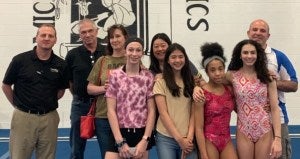“Well-oiled Machine” – Comprehensive Stroke Team Saves Out-of-Towner’s Life
May 26, 2019
By: Katie Halloran
Categories: Cardiovascular Health
“Out of the way, coming through!”
Overhead lights whizzed by 61-year-old Andrew Barta, who was lying on his back, immobile. He was having a massive stroke.
As the clinical team raced Barta on a stretcher from the Emergency Department at Mercy Health Saint Mary’s to Interventional Radiology for an emergent mechanical thrombectomy, one of the last things Barta remembered before everything went black is a soothing voice in his ear: “You’re doing great; you’re doing fine.”
Thanks to the quick work of the multidisciplinary stroke team at Mercy Health, the first responders and his friends and family, those aren’t Barta’s last memories.
Not only did Barta survive his ischemic stroke, Barta suffered no ill side effects from his “brain attack,” another name for a stroke.
“My doctor of 20 years said, ‘I don’t believe you had a stroke, Andy. You should be in a wheelchair,’ until he thoroughly looked at my chart, and said, ‘Well, I guess you did.'”
During a follow-up appointment, Barta’s primary care physician attempted to find deficits from the stroke. The doctor had Barta close his eyes while he moved a feather across his body.
“I could feel the feather the whole time,” said Barta proudly. His sensory was intact.
A manager for a prototype shop on the east side of the state, in Livonia, Michigan, Barta credits the clinical acumen comprehensive stroke team at Mercy Health Hauenstein Neuroscience Center with his extraordinary recovery. Barta was back at work in the shop within three weeks after his stroke, truly remarkable because stroke is a leading cause of long-term disability in the United States.
“If I had their [stroke] team in my shop, I’d say they are a well-oiled machine,” said Barta.
Barta’s incredible stroke story begins in early March 2019. While putting the finishing touches on his house, a power saw launched a large piece of wood at Barta, hitting him in the head hard enough to cause a nose bleed.
“Doctors believe this ruptured the lining of my blood vessels, possibly starting all of this,” Barta said.

Fast forward from his nose bleed to a week later, on March 17, a Sunday morning. Barta and his wife, Lori, along with many other families, attended a gymnastics meet in Grand Rapids, Michigan. Their 13-year-old daughter was competing at the state level.
“The weird thing was, I felt great the night before,” recalled Barta. “I felt great that morning.”
During the national anthem, suddenly Barta noticed his foot went numb after he sat on the bleachers. Then his leg wouldn’t move; then his arm couldn’t either. He couldn’t use his camera, talk or stand up. Paralyzed, he was miraculously able to mumble to Lori, “I think I am having a stroke.”
A first response crew was beneath him in the bleachers. Not wanting to disrupt the meet and ruin his daughter’s chances of placing at regionals, Barta, with the help of his friend and fellow gymnast parent Bryan, quietly slid between and underneath the bleachers to reach the first responders. Another friend and parent, Kathy, immediately went into action, recognizing not only that Barta was having a stroke, but also keeping her calm to assist guiding Barta’s wife Lori to where the first responders were.
“You are having a stroke!” The first responder immediately recognized the symptoms, and the team placed Barta on the stretcher and immediately prepared him for transport.
“We’re taking you to Mercy Health Saint Mary’s; it will be a four-minute drive,” Barta remembered hearing from the EMT. “They’ll take the best care of you there.”
His body paralyzed, Barta’s mind was still intact as he was loaded into the back of an ambulance and taken to Mercy Health Saint Mary’s, a certified comprehensive stroke center, where a team was already waiting for him. “Kathy barely had time to get Lori in the front seat of the ambulance, it all happened that fast.”
Upon his arrival at Mercy Health, Barta was treated with the “clot-busting” medication tPA, administered through an IV. Barta needed additional treatment, which led to his swift transfer to the Interventional Radiology suite.
It was here that Neurointerventionalist Baljit Deol, MD, performed an emergent mechanical thrombectomy, which is a minimally invasive surgery where specialized equipment is used to evacuate the clot within Barta’s brain.
Right up to his thrombectomy, Barta could see everything and hear the voice of Connie Brooks, RN, Interventional Radiology nurse at Mercy Health, soothing him, “You’re doing great; you’re doing fine.”
Then everything went black. After he came to, Barta could see again. “Everything was so vibrant.” He could move his fingers. “Hold still,” he was instructed by Radiology Technician Chris Schmidt. “Don’t move ANYTHING.”
“Do you remember what happened?” he was asked.
“I …think I had a stroke…?” Barta half-asked.
“Yes, you did,” said Radiology Technologist Chris Hoffman. After a few minutes passed, he was asked to move his arm. He did so with ease.
To the amazement of everyone, Barta has had a complete recovery. His daughter’s coach brought her to visit Barta at the hospital only a few hours later; she had qualified for regionals.
“I’m hugely indebted to this great team at Mercy Health,” Barta said. “If it weren’t for them, I wouldn’t be working again in my shop; I would be on disability.”
To be able to help someone who’s having a stroke, get familiar with BE FAST, an acronym used to remember common symptoms of stroke:
BALANCE – Sudden dizziness, loss of balance or coordination.
EYES – Sudden trouble seeing out of one or both eyes.
FACE –First, check for facial weakness. An uneven smile or weakness on one side could mean trouble.
ARMS – Next, check for arm weakness. Inability to raise both arms evenly could be another sign.
SPEECH –Check for impaired speech. Slurred speech or difficulty repeating simple phrases could mean a stroke.
TIME – Immediately call 911.




